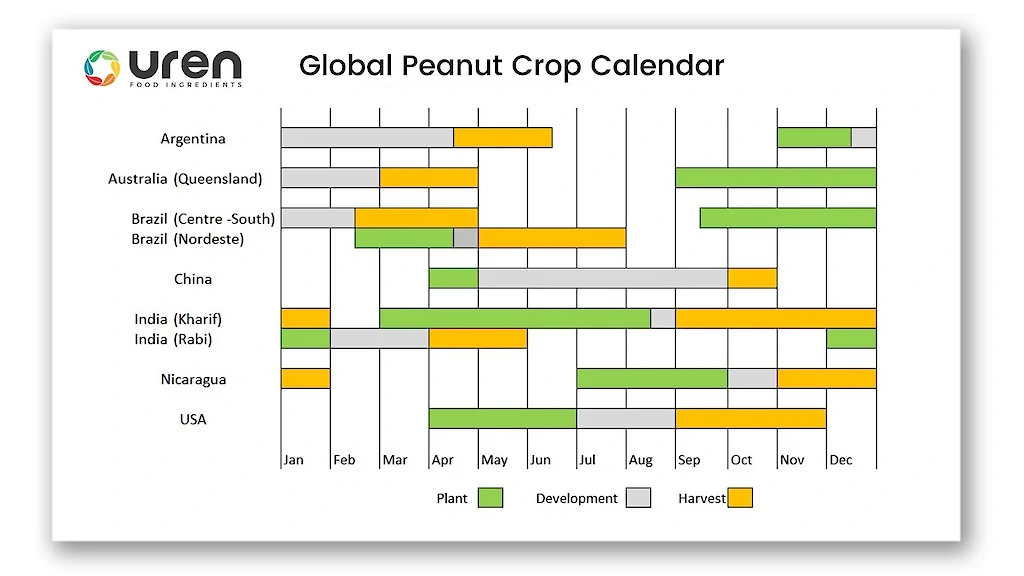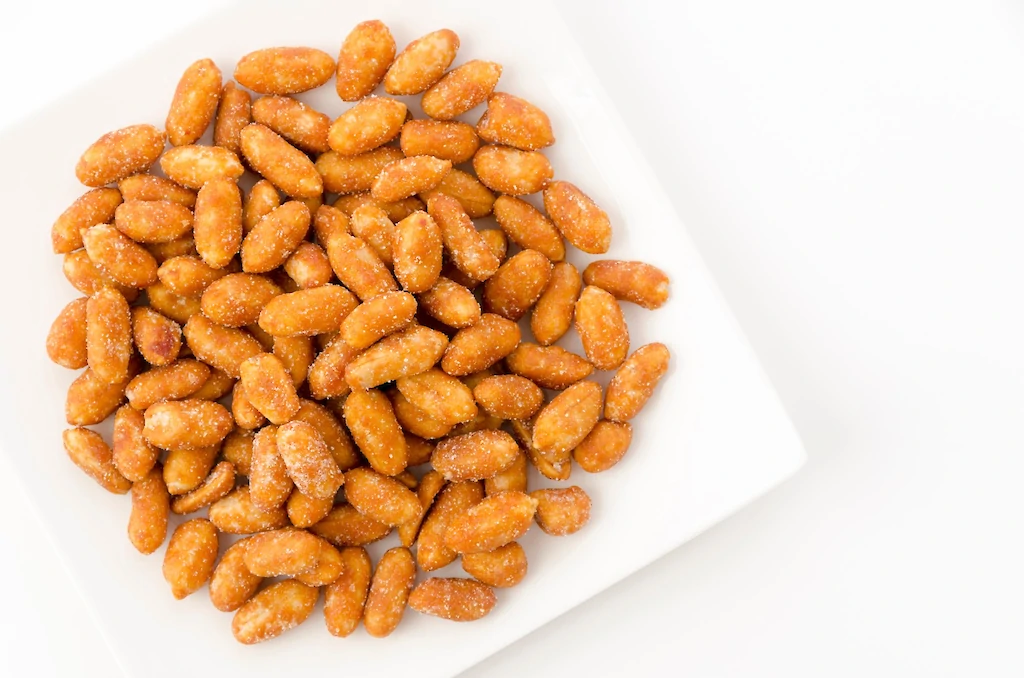Peanuts

Enquire about our
Spec/Crop Report
Products
Nuts Product List
Product List – Peanuts & Tree NutsPeanuts
Naturally high in fat, protein and essential minerals, with a relatively long shelf life, the popularity of peanuts has been increasing in recent years. Blanched peanuts are often salted, roasted and/or blended with oil, salt or sugar to make a variety of products.
For almost a decade, Uren has sourced and supplied the highest quality peanuts globally. We offer a range of packaging options to our customers, get in touch with our team for further information or to get a quote.
How we source the best peanuts
As peanuts grow all over the world, they have different growing cycles and harvesting times. We only work with BRC or GFSI accredited suppliers, with most of these relationships being well established and cultivated over many years.
Uren stocks and supplies peanuts from several origins, including Argentina, Nicaragua, Brazil, the USA and China. The vast majority are of Argentinian origin. The Argentinian runner variety is naturally high in oleic acid which provides a longer shelf life to products that are roasted. This is an important factor to those customers who wish to process further in the UK.
Depending on the type of yield for each country of origin, the availability of the product types can vary, if the crop is good and they don’t get a lot of Split peanuts through shelling, the price and availably for these can increase. The same for the opposite, if they find they have a lot of split peanuts and now many whole peanuts the availably can affect the price. Each crop year can vary massively and be affected by weather, field rent, availability of peanut size, or even by the quality of the product.
Learn more about the Impact of Rainfall Variation in South America on Peanut Crop Size.
Global Peanut Crop Calendar
Peanuts grow all over the world and often ‘shellers’ will take the outer husk and separate it from the peanuts within, leaving individual peanuts which will have their skin still on. Interestingly, the husks are burnt to produce heat which can be used to generate power to help run some factories.
More information on different harvesting and growing cycles can be seen here on our Crop Calendar - download your copy here.

Peanut Harvesting Process
Peanuts are planted in the spring and take between 120 to 150 days, dependent on the variety, to grow and be ready to harvest in the autumn, usually September-October.
To develop well they need warm weather throughout the growing season. When ready for harvest the entire plant is pulled from the ground and left in the field for around three or four days to dry out.
This allows the peanuts to dry out slowly to around a third of their original moisture level. As they will still have a high moisture content the peanuts need to be dried out further so are loaded onto a drying wagon which passes warm air through them to bring moisture levels down. This drying process is critical for the optimal harvest.
The raw unshelled peanuts are then graded by size and quality. The graded peanuts are then purchased by large shelling plants who take the peanut kernels out of the shells and further clean and process them.
Peanut blanching process
Blanching is a process used to remove the peanut skins. The raw peanuts are put into hot water for a few minutes to soften the skin. They are then passed through a series of rubber rollers to remove the loosened skins. Blanched peanuts have a softer texture than unblanched peanuts.
Peanut roasting process
Roasting peanuts changes the colour and flavor profile of the peanut. Once the peanuts have been harvested, dried out, and shelled, they are then dry roasted using hot air.
During this process, the moisture evaporates from the peanuts resulting in a crunchier texture and darker colour. During the roasting process, a reaction also takes place between the sugars and amino acids which changes the flavour. Roast peanuts can be either light, medium, dark, or extra-dark roasted, dependent on your manufacturing needs. The darker the roast you want, the longer the peanut is roasted.
Salting process
To produce salted peanuts, producers soak the peanuts in a salt solution inside a vacuum. The pressure causes the salt to get pulled into the peanut, resulting in a salty taste. After the salting process, the peanuts are dry roasted to remove the water, leaving behind crisp, salted peanuts.

Learn more
If you are looking for more information about peanuts or any other nuts that we supply, get in touch with our team.
Bird Feed Peanuts
Various sizes and packaging options.
Blanched Peanuts
Split & Whole
Blanched & natural (unblanched)
Packaging: 900kg + bags & 25kg vacuum bags
Nibs Roasted Peanuts
2-6mm
Light, Medium, Dark Roast
Packaging: 25kg vacuum bags inside cartons
Oil Fried Salted Peanuts
Split & Whole
Blanched & natural (unblanched)
Packaging: 25kg vacuum bags inside cartons
Organic Peanuts
Split & Whole
Blanched & natural (unblanched)
Origin: China & others
Packaging: 950kg bags & 25kg vacuum bags
Peanut Flour
12% & 28% fat
Light & Strong Roast
Packaging: 22.68kg bags (50lb)
Raw Inshell Peanuts (Monkey nuts)
11-13 (2x kernels inside)
15kg bags
Roasted Inshell Peanuts (Monkey nuts)
11-13 (2x kernels inside)
15kg bags
Roasted Peanuts
Split & Whole
Blanched & natural (unblanched)
Light, Medium, Dark Roast
Packaging: 25kg vacuum bags inside cartons
Roasted Salted Peanuts
Split & Whole
Blanched & natural (unblanched)
Packaging: 25kg vacuum bags inside cartons
Unblanched Peanuts (raw)
Whole
Packaging: 900kg + bags & 25kg vacuum bags











